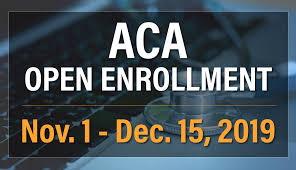Sunday, Dec. 15, is the deadline to sign up for federally subsidized health insurance, better known as Obamacare

By Melissa Patrick
Kentucky Health News
Time is running out to sign up for federally subsidized health insurance for 2020. The deadline for enrollment on Healthcare.gov is Sunday, Dec. 15, and fewer Kentuckians have enrolled than at this time last year.
Five weeks into to the six-week enrollment period, Kentucky enrollment on the federal exchange was
The numbers for both years only reflect people who had signed up for a new plan or who had actively chosen a plan. Those who already have plans on Healthcare.gov and don’t choose a new one will be automatically re-enrolled, and those numbers haven’t yet been included in the enrollment reports.
Even if you have a plan on Healthcare.gov, experts say it’s a good idea to look at all of your options each year to make sure you have the plan that best suits your needs or offers the best cost.
Josh Peck, the founder of Get America Covered, told Inside Health Policy that while it’s concerning that the numbers are down, new enrollees are up nationally compared to last year, which “could bode well for final sign-up totals.” Further, he noted that there is usually a surge of enrollment during the last weeks of sign-ups.
Don’t assume you can’t afford coverage, because most people using the marketplace qualify for financial help to lower their costs. In 2019, 79 percent of Kentuckians enrolled through the federal exchange qualified for tax credits and subsidies that reduced their premiums.
A person should qualify for a federal subsidy, or a tax credit, with an income between 100% and 400% of the federal poverty level. The federal government has an online calculator that indicates whether you fall into this bracket.
Consumers should also be wary of plans that appear to meet the Patient Protection and Affordable Care Act standards, but actually don’t. That’s because President Trump’s administration, which has tried to weaken “Obamacare” after failing to repeal it, has loosened restrictions on plans that aren’t compliant with the ACA, called “short-term plans,” which are less expensive but offer less coverage.
The best way to make sure your plan is ACA-compliant is to shop on Healthcare.gov; if you are working through an insurance broker, say you want an ACA-compliant plan.
Where can I find help?
The state-based call center is available at 855-459-6328 to help assist Kentuckians with where to go for coverage, answer questions and pre-screen for eligibility. The Healthcare.gov customer service center (800-318-2596) is also available 24 hours a day, seven days a week. Click here to find an application assister or an insurance agent near you.
Carol Adkins, coordinator of community engagement and outreach for the Kentucky Primary Association, encouraged Kentuckians who are signing up for health insurance on Healthcare.gov to talk to an application assister each year before they sign up because plans often change and premiums and options fluctuate.
“Always make plans to meet with a free, certified application assister to help you apply or re-certify,” she said in an e-mail. “They are trained to help with the initial application, answer questions, explain options, assist with enrollments and more.”
She stressed that assisters are not agents and do not benefit in any way from your enrollment, but are simply there to help you with your application at no cost to you. She also noted that KPCA has assisters that specifically work on connecting children with coverage all over the state.
If you miss the deadline, the only way you’ll be eligible to enroll in or change your health plan for 2020 is if you qualify for a special enrollment period. To qualify for special enrollment, you must have a qualifying life event such as a change in family status (for example, marriage, divorce, birth, or adoption of a child), change in residence, or loss of other health coverage (such as loss of employer-based coverage, or loss of eligibility for Medicare or Medicaid).
